Mercedes C-Class Sedan VS BYD ETP3 – Specs, Efficiency & Price Comparison
Find out now which car fits your needs better!
The Mercedes C-Class Sedan (Sedan) is powered by a Diesel MHEV, Petrol MHEV or Plugin Hybrid engine and comes with a Automatic transmission. In comparison, the BYD ETP3 (Cargo Van) features a Electric engine and a Automatic gearbox.
When it comes to boot capacity, the Mercedes C-Class Sedan offers 455 L, while the BYD ETP3 provides – depending on what matters most to you. If you’re looking for more power, you’ll need to decide whether the 680 HP of the Mercedes C-Class Sedan or the 136 HP of the BYD ETP3 suits your needs better.
There are also differences in efficiency: 1.60 L vs . In terms of price, the Mercedes C-Class Sedan starts at 41200 £, while the BYD ETP3 is available from 31600 £.
Compare all the key specs now and find out which model fits your lifestyle best!
Mercedes C-Class Sedan
The Mercedes-Benz C-Class Sedan embodies a seamless blend of luxury and performance, capturing the quintessential essence of sophisticated driving. Its elegant design is complemented by a meticulously crafted interior, featuring premium materials and innovative technology to enhance comfort and convenience. On the road, the C-Class Saloon offers an impressive driving experience, harmonising precise handling with a composed and comfortable ride.
details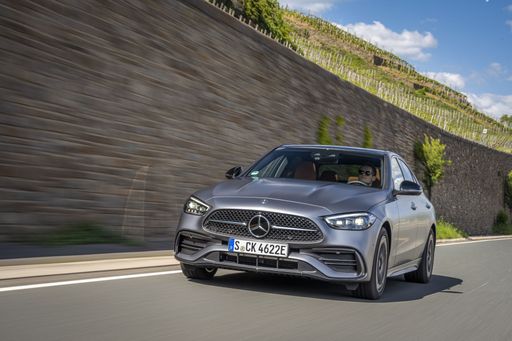 @ group-media.mercedes-benz.com
@ group-media.mercedes-benz.com
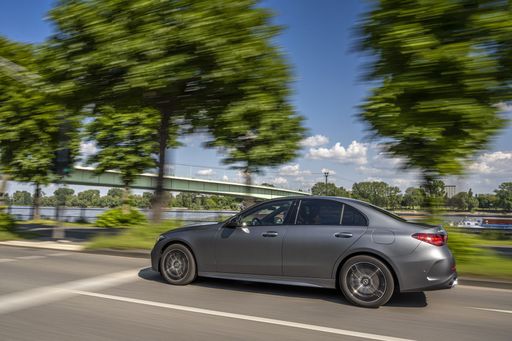 @ group-media.mercedes-benz.com
@ group-media.mercedes-benz.com
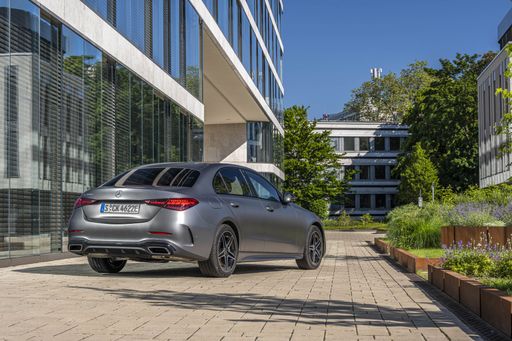 @ group-media.mercedes-benz.com
@ group-media.mercedes-benz.com
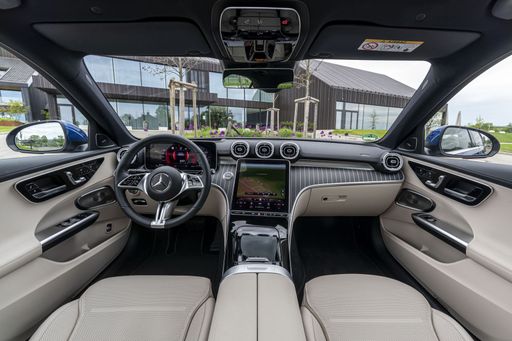 @ group-media.mercedes-benz.com
@ group-media.mercedes-benz.com
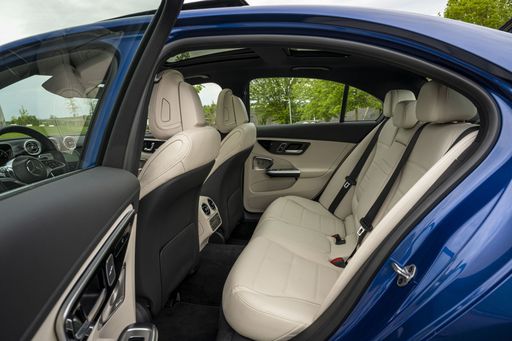 @ group-media.mercedes-benz.com
@ group-media.mercedes-benz.com
BYD ETP3
The BYD ETP3 is a versatile electric van that seamlessly blends functionality with environmental consciousness. Its modern design is complemented by a spacious interior, making it ideal for both urban deliveries and day-to-day personal use. Advanced technology features ensure a smooth and efficient driving experience, setting a new standard in the electric vehicle market.
details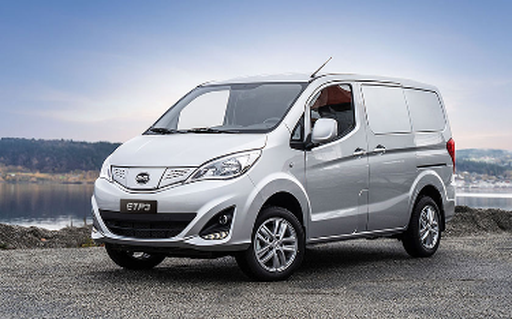 @ press.bydauto.be
@ press.bydauto.be

|

|
|
|
|
Costs and Consumption |
|
|---|---|
|
Price
41200 - 103100 £
|
Price
31600 £
|
|
Consumption L/100km
1.6 - 9 L
|
Consumption L/100km
-
|
|
Consumption kWh/100km
-
|
Consumption kWh/100km
-
|
|
Electric Range
11 - 117 km
|
Electric Range
233 km
|
|
Battery Capacity
19.50 kWh
|
Battery Capacity
-
|
|
co2
41 - 205 g/km
|
co2
0 g/km
|
|
Fuel tank capacity
40 - 66 L
|
Fuel tank capacity
-
|
Dimensions and Body |
|
|---|---|
|
Body Type
Sedan
|
Body Type
Cargo Van
|
|
Seats
5
|
Seats
2
|
|
Doors
4
|
Doors
5
|
|
Curb weight
1695 - 2195 kg
|
Curb weight
1640 kg
|
|
Trunk capacity
280 - 455 L
|
Trunk capacity
-
|
|
Length
4751 - 4842 mm
|
Length
4460 mm
|
|
Width
1820 - 1900 mm
|
Width
1720 mm
|
|
Height
1438 - 1458 mm
|
Height
1875 mm
|
|
Payload
480 - 610 kg
|
Payload
780 kg
|
Engine and Performance |
|
|---|---|
|
Engine Type
Diesel MHEV, Petrol MHEV, Plugin Hybrid
|
Engine Type
Electric
|
|
Transmission
Automatic
|
Transmission
Automatic
|
|
Transmission Detail
Automatikgetriebe
|
Transmission Detail
-
|
|
Drive Type
Rear-Wheel Drive, All-Wheel Drive
|
Drive Type
Rear-Wheel Drive
|
|
Power HP
183 - 680 HP
|
Power HP
136 HP
|
|
Acceleration 0-100km/h
3.4 - 8.6 s
|
Acceleration 0-100km/h
-
|
|
Max Speed
230 - 280 km/h
|
Max Speed
100 km/h
|
|
Torque
250 - 1020 Nm
|
Torque
180 Nm
|
|
Number of Cylinders
4
|
Number of Cylinders
-
|
|
Power kW
135 - 500 kW
|
Power kW
100 kW
|
|
Engine capacity
1496 - 1999 cm3
|
Engine capacity
-
|
General |
|
|---|---|
|
Model Year
2024 - 2025
|
Model Year
2023
|
|
CO2 Efficiency Class
D, G, E, B
|
CO2 Efficiency Class
A
|
|
Brand
Mercedes-Benz
|
Brand
BYD
|
Mercedes C-Class Sedan
Unveiling the Mercedes-Benz C-Class Sedan: A Symphony of Innovation and Performance
The Mercedes-Benz C-Class Sedan is a statement of luxury and innovation. With impeccable design, cutting-edge technology, and remarkable performance, it continues to set benchmarks in the automotive world. In this article, we explore the technical marvels and innovations that define the latest iteration of this iconic series.
Innovative Powertrains: Driving Efficiency and Performance
Mercedes-Benz has expertly engineered the C-Class Sedan to offer a diverse range of powertrains. From mild hybrids to plug-in hybrids, the C-Class blends performance with efficiency. The petrol and diesel mild-hybrid options boast outputs ranging from 183 to 422 PS, while the plug-in hybrids can deliver up to an impressive 680 PS. These innovative powertrains are designed to reduce emissions without compromising on driving pleasure.
The electrified options also offer a remarkable electric-only range of up to 116 km, allowing for more eco-friendly urban driving. Meanwhile, the advanced 9G-TRONIC automatic transmission enhances performance by ensuring smooth and responsive gear changes.
State-of-the-Art Technology: Connecting You to the Road
The C-Class Sedan is equipped with the latest Mercedes-Benz technology, offering an unparalleled driving experience. The MBUX (Mercedes-Benz User Experience) system, featuring natural language understanding, keeps drivers informed and entertained while maintaining focus on the road.
The display's high-resolution graphics provide clear information, and the optional Augmented Reality Navigation makes following directions a seamless task. Furthermore, the vehicle’s driver assistance systems, such as Active Lane Keeping Assist and Adaptive Cruise Control, ensure a safer and more relaxing journey.
Design and Comfort: Luxury on Four Wheels
With its elegant styling, the C-Class Sedan is a striking figure on roads worldwide. The exterior boasts dynamic lines and a bold front grille, exuding a sense of confidence and prestige. Inside, the cabin is a haven of comfort, employing high-quality materials and meticulously crafted details.
The roomy interior can comfortably seat five passengers, while the boot offers ample space for luggage, making it ideal for long-distance travel. Options for customisation from the AMG Line to Avantgarde packages allow buyers to tailor their vehicle to their personal tastes.
Environmental Consciousness: Leading the Charge for a Sustainable Future
Mercedes-Benz is committed to sustainable mobility, and the C-Class Sedan exemplifies this with its eco-friendly features. The plug-in hybrid models offer significant reductions in fuel consumption and CO2 emissions, with some versions achieving as low as 0.4 L/100 km and 11 g/km CO2 emissions.
By integrating innovative battery technologies and energy recovery systems, Mercedes-Benz supports greener driving practices while maintaining the exhilarating performance expected from their vehicles.
Conclusion: The C-Class Sedan - A Class Apart
The Mercedes-Benz C-Class Sedan represents the pinnacle of automotive engineering and luxury. With its variety of powertrains, advanced technological features, emphasis on comfort, and commitment to sustainability, it is a vehicle designed not only to meet the demands of modern drivers but to exceed them. Once again, Mercedes-Benz has delivered a car that is as exciting to drive as it is responsibly engineered.
BYD ETP3
A Revolution in Electric Transport: The BYD ETP3
The BYD ETP3, a breakthrough in the realm of electric light-commercial vehicles, epitomises innovation and efficiency. As a trailblazer from the Chinese automotive giant BYD, the ETP3 is designed to redefine the electric vehicle (EV) market, blending practicality with cutting-edge technology. This article delves into the technical details and groundbreaking innovations that make the BYD ETP3 an intriguing contender in the field of green transportation.
Powertrain and Performance: Setting New Standards
At the heart of the BYD ETP3 lies an electric motor delivering an impressive 136 PS (100 kW), with a rear-wheel drive configuration that ensures a robust performance. This setup promises a seamless driving experience augmented by a torque of 180 Nm, rendering the ETP3 adept at handling the rigorous demands of logistics and commercial tasks.
The vehicle's 233 km electric range reaffirms its position as a practical and efficient choice for city-based transport, reducing the need for frequent charging stops and enhancing productivity. The maximum speed of 100 km/h ensures the ETP3 remains steady and safe on urban roadways.
Innovative Design and Practicality
The BYD ETP3, while primarily focused on functionality, does not compromise on aesthetics. The sleek exterior, extending to 4,460 mm in length, 1,720 mm in width, and 1,875 mm in height, is thoughtfully designed to maximise both aerodynamic efficiency and load space. With a generous payload capacity of 780 kg, the ETP3 is poised to meet the diverse needs of urban businesses and tradespeople.
Built on a foundation of innovation, the vehicle employs a reduction gearbox to ensure smooth transitions, enhancing the overall driving experience. This technological innovation positions the ETP3 as an easy-to-handle and responsive option for urban and suburban environments.
A Commitment to Sustainability
One of the standout features of the BYD ETP3 is its commitment to environmental sustainability. With a CO2 emission rating of 0 g/km, it represents a significant step forward in reducing the carbon footprint of commercial vehicles. This remarkable achievement is complemented by its CO2 efficiency class rating of A, making it not only a financially savvy option in terms of operational costs but also an environmentally responsible choice.
The Comfort Line: Meeting Everyday Needs
The ETP3 comes equipped with the 'Comfort' trim, manifesting in a range of features designed to enhance user experience. With room for two seats, this vehicle balances free space for cargo with driver and passenger needs, ensuring comfort without compromising functionality.
Conclusion: BYD ETP3 - A Glimpse into the Future
The BYD ETP3 emerges as a frontrunner in the electric van market, combining efficiency, sustainability, and practical design. Its array of thoughtful innovations and technical specifications render it highly appealing for any business prioritising eco-friendly transport solutions. As the automotive industry continues to evolve, the ETP3 remains at the forefront, representing the future of logistics and urban transport.
The prices and data displayed are estimates based on German list prices and may vary by country. This information is not legally binding.
